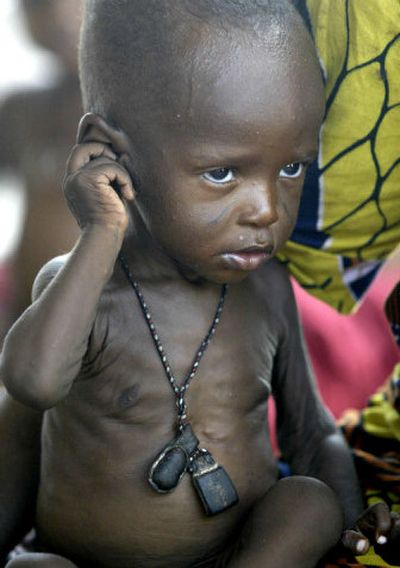Niger leader decries ‘false’ famine reports

NIAMEY, Niger – Niger’s president played down the food crisis ravaging his desert nation, insisting Tuesday that people in the impoverished West African country “look well-fed.”
In an interview with the British Broadcasting Corp., President Mamadou Tandja acknowledged that a devastating locust invasion last year and poor rains have produced food shortages.
But he said that was not unusual for his country – or for the entire Sahel region, a semi-desert scrubland that straddles the southern edge of the Sahara desert.
“We are experiencing like all the countries in the Sahel a food crisis due to the poor harvest and the locust attacks of 2004,” Tandja told the BBC.
“The people of Niger look well-fed, as you can see,” he added.
TV networks have for weeks broadcast images of severely malnourished, skeletal children in Niger, many too weak to brush flies from their faces. Scores have died.
The United Nations says the combined effects of drought and crop-destroying locusts have left some 3.6 million people facing severe food shortages in Niger. Children are most at risk, with some 800,000 under the age of 5 who need to be fed urgently, the United Nations says.
Tandja said the reports of famine were “false propaganda” that had been used by the United Nations, aid agencies and opposition parties for political and economic gain.
“It is only by deception that such agencies receive funding,” Tandja said.
He also said his government had subsidized food prices since last year in an effort to ease the crisis.
However, experts have questioned whether that response was misguided, rather than distributing free food for fear of hurting local markets.
Meanwhile, U.N. officials announced Tuesday the U.N. food agency had made its first delivery to a village in southwestern Niger, marking the start of the World Food Program’s plan to distribute badly needed rations to 2.5 million people.
The U.N. agency will distribute food over the next two months. A second round of rations is due in September to help villagers until the harvest in October.
“This marks the beginning of distributions on a large scale,” the World Food Program, which is based in Rome, said of the delivery of the aid on Monday in Tolkobey, about 55 miles from Niamey, Niger’s capital.
Late last month, the U.N. agency distributed about 3,300 tons of food to humanitarian groups for severely malnourished children at special centers.
The U.N. agency says it has received about $23 million in contributions but still needs about $34 million to fund the program.